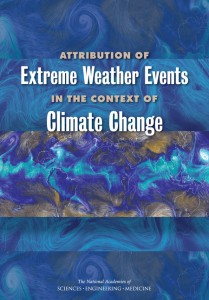From an Article by Jessica Corbett, Common Dreams, July 27, 2018
With wildfires raging the world over, a new preliminary analysis conducted by the World Weather Attribution (WWA) and reported by the Guardian found that the global climate crisis notably increased the likeliness of last year’s Hurricane Harvey and “Lucifer” heat wave, as well as the current heat wave sweeping across Northern Europe and fueling fires in the Arctic Circle.
“This is something that society can and should prepare for. But equally there is no doubt that we can and should constrain the increasing likelihood of all kinds of extreme weather events by restricting greenhouse gas emissions as sharply as possible.”
— Friederike Otto, University of Oxford
“We found that for the weather station in the far north, in the Arctic Circle, the current heat wave is just extraordinary—unprecedented in the historical record,” said Geert Jan van Oldenborgh of the Royal Netherlands Meteorological Institute and WWA.
The researchers found that climate change made the heat wave in Northern Europe more than twice as likely, Hurricane Harvey three times more likely, and the Lucifer heat wave 10 times more likely.
“By comparing extreme weather with historical measurements and with computer models of a climate unaltered by carbon emissions, researchers can find how much global warming is increasing the risk of dangerous weather,” the Guardian explained. This analysis differs from a full study that would require “many climate models to be run on high-powered computers, which takes months.”
Summarizing their conclusion, Friederike Otto of the University of Oxford and WWA told the newspaper, “The logic that climate change will do this is inescapable—the world is becoming warmer, and so heat waves like this are becoming more common.”
While “most heat wave studies have been done on large scale averages, so European-wide temperatures,” Otto noted that “in this study, we have looked at individual locations, where people live, to represent the heat wave people are actually experiencing.”
The heat wave that has fueled more than 50 fires in Sweden in recent weeks has also caused excessive heat throughout the U.K. and Europe—including in Greece, where a fire killed dozens earlier this week.
Pointing to recent comments from British politicians who are demanding concrete action to prevent such events from becoming the “new normal” and endangering thousands or even millions of lives, 350.org echoed their call and highlighted worldwide rallies planned for September 8th to demand a future free of fossil fuels.
“What was once regarded as unusually warm weather will become commonplace, and in some cases, it already has,” Otto concluded. “So this is something that society can and should prepare for. But equally there is no doubt that we can and should constrain the increasing likelihood of all kinds of extreme weather events by restricting greenhouse gas emissions as sharply as possible.”
>>>>>>>>>>>>>>>>>>>>>>>>>>>>>>>
Comment from 350.org on July 27, 2018
So true. The intense heat so many people are experiencing just goes to show – climate change is here, now. It will get worse – so we have to do better. Let’s all take action and #RiseForClimate on September 8th.
See also: http://350.org/rise
— 350 dot org (@350) 9:28 AM – July 27, 2018


{ 1 comment… read it below or add one }
Study: Climate change hinders summer fun on Lake Erie
From Marie Cusick, State Impact — Pennsylvania, August 14, 2018
Increased water quality problems tied to global climate change are affecting the way people fish, boat, and swim on Lake Erie, according to a paper published last month in the Journal of Park and Recreation Administration.
Researchers from the University of New Hampshire and Penn State University surveyed visitors in 13 coastal parks and protected areas along Pennsylvania’s 77 miles of Lake Erie shoreline from May through September 2015. Visitors reported things like harmful algal blooms and E. coli bacteria were negatively impacting their efforts to enjoy themselves on the water.
“These are relative age-old problems on Lake Erie, but they are being exacerbated by the presence of global climate change factors in the region,” said lead author Michael Ferguson, an assistant professor of Recreation Management and Policy at the University of New Hampshire. “Climate change is only expected to intensify these adverse environmental conditions, and we’re really striving to understand how this affects the behavior of outdoor recreationists.”
For example, he said, warmer temperatures are driving an increased rain cycle — leading to fluctuating water levels and more runoff polluting the lake.
Visitor responses to the water quality problems varied. In some cases, people waited until later in the day to go swimming, or reported having to head for deeper water to fish. Some people chose to leave the area entirely and not return.
“This is a very real problem,” Ferguson said. “It’s something visitors are encountering right now on the Great Lakes. This could have a large impact, not only on the public, but also on the surrounding towns that depend on the outdoor tourism economy.”
For example, this summer Presque Isle State Park’s beach has been plagued with high E.coli bacteria counts, leading to swimming advisories and restrictions.
“While this study took place within the Pennsylvania coastal section of Lake Erie, this is really just a snapshot of what is happening to many similar bodies of water across the country,” Ferguson said.
The study was funded by the Pennsylvania Sea Grant, which is administered through the National Oceanic and Atmospheric Administration.